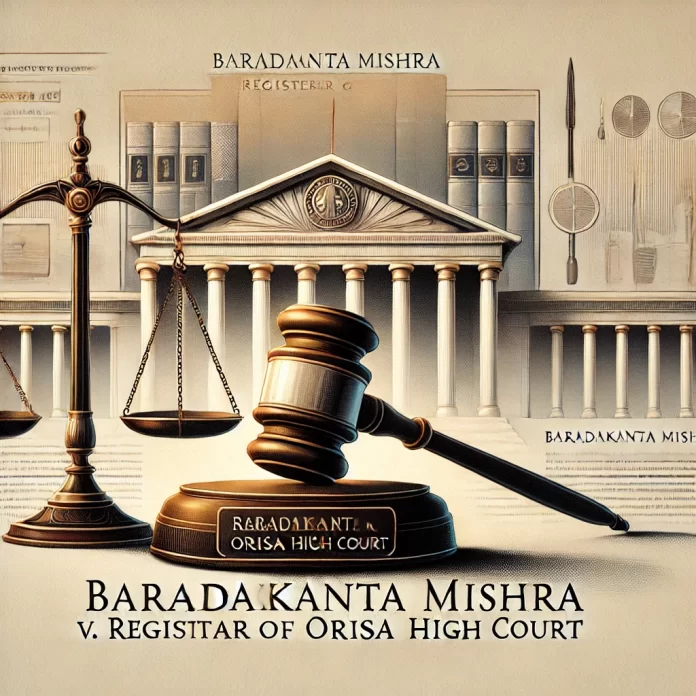Case Summary: Baradakanta Mishra v. Registrar of Orissa High Court
Citation: (1974) 1 SCC 374
Facts of the Case
- Case Background: Baradakanta Mishra, who served as a judge in the Orissa High Court, faced allegations of judicial impropriety. It was claimed that he issued orders favoring a particular party without adhering to established legal principles.
- Registrar’s Action: The Registrar of the Orissa High Court initiated an inquiry into Mishra’s alleged misconduct, which was seen as damaging to the credibility of the judiciary.
- High Court Inquiry: Following the inquiry, a committee of the High Court found merit in the allegations and recommended disciplinary measures.
- Challenge in the Supreme Court: Mishra contested the inquiry’s validity before the Supreme Court, arguing that it infringed on judicial independence and was procedurally flawed.
Relevant Legal Provisions
- Constitution of India:
- Article 226: Grants High Courts the power to issue writs.
- Article 233: Governs the appointment and control of district judges.
- Article 235: Confers supervisory authority on High Courts over subordinate courts.
- Article 124: Recognizes judicial independence as a fundamental constitutional principle.
- Judicial Accountability: Addresses the necessity of balancing judicial independence with mechanisms to address judicial misconduct.
Key Issues
- Was the inquiry conducted against a sitting High Court judge by the Registrar constitutionally valid?
- Did the inquiry breach the principle of judicial independence?
- How should judicial misconduct be defined, and what is its impact on the judiciary’s integrity?
Key Principles Established by the Supreme Court
- Accountability within Judicial Independence: Judicial independence is a cornerstone of the Constitution, but it does not exempt judges from being accountable for their actions. The judiciary must maintain both independence and public trust.
- Fair Process in Disciplinary Proceedings: The Court highlighted the importance of procedural fairness and natural justice during inquiries into judicial conduct. Investigations must balance the dignity of the office with the need for accountability.
- High Court Supervision of Subordinate Judiciary: Article 235 grants the High Court supervisory control over the subordinate judiciary. This control must be exercised responsibly and in accordance with constitutional principles.
- High Standards for Judicial Conduct: Judges are expected to uphold integrity and impartiality. Any deviation undermines public confidence in the judicial system and affects the institution’s credibility.
Supreme Court’s Judgment
The Supreme Court upheld the inquiry conducted by the Orissa High Court’s Registrar, stating that it was necessary and constitutionally valid. The Court determined that the allegations against Mishra were serious and justified a formal inquiry. It ruled that the process did not violate judicial independence, as accountability is essential to maintaining the judiciary’s credibility.
Conclusion
This case underscores the balance between judicial independence and the necessity for accountability. It established that judicial officers must adhere to high ethical standards and are not immune to scrutiny. However, any inquiry into their conduct must ensure fairness and respect for their constitutional role, ultimately safeguarding public trust in the judiciary.
